
Boy eating ice cream and wondering why his picture is leading this article.
Source: skeeze w/ Public Domain license.
Curtain Open
The influence of hormones on the body and the self is so well-established and all-encompassing that it prompted an adjunct professor at Columbia University and lecturer at Yale University to title her recent book (published 6 months ago) "Aroused: The History of Hormones and How They Control Just About Everything"
Yes, hormones control (just about) everything. Not just the things you don't mind being controlled, but also the things that control your mind. Linda Mealey, who wrote an advanced textbook on all things sex differences, reminds us that:
the way sex hormones work is to turn on certain otherwise-dormant genes. This is done just as easily in cells of the brain as in cells of breast tissue, hair follicles, or any other organ of the body; it is also done just as easily after birth as before.[1]
More succinctly: sex hormones aren't just for boobs; they're also for brains.
Believing that sex hormones can influence things like breast size but can't influence anything that would offend you (like math or verbal skills that reside in the brain), is like believing that Jesus may well have turned water into wine (cos you like wine), but that feeding 5 thousand people with just 5 loaves of bread is obviously ridiculous (cos you have a gluten allergy).
It's surprising that we would expect any different, because it's not like our closest relatives are any exception:
That male and female brains function differently on average has been established in all mammalian species examined to date[2]
*
In my first 9 or so posts about sex differences I investigated John Money's criteria for determining a person's sex and gender. The last of these, which I'll be treating in this post and the next, is pubertal hormones. Pubertal hormones trigger both the primary sexual characteristics (that's spermarche (sperm production) in males and menarche (ovulation and menstrual cycle) in females) and the secondary sexual characteristics (anything other than spermarche and menarche, e.g. brain, bones, blood, breasts, etc.) I'll be treating the topic by taking interesting snapshots rather than doing a 3200 panorama photo of it.
Because not all societies agree that pubertal growth happens via the hormones, for the sake of completion I'll also be mentioning, in the last section, a rather more radical theory of how growth comes about. :D
So let's get the wheels turning.
What Humans Have in Common with Rats
The evidence that hormones affect behavior is not only plentiful in both human and nonhuman animal studies, but oftentimes it is also parallel.
For example, adult female rodents are more active than males. This sex differentiation occurs after puberty, if the female brain is not exposed to androgens (male hormones). In both male and female rodents, treatment with estrogen (female hormones) increases wheel running activity.
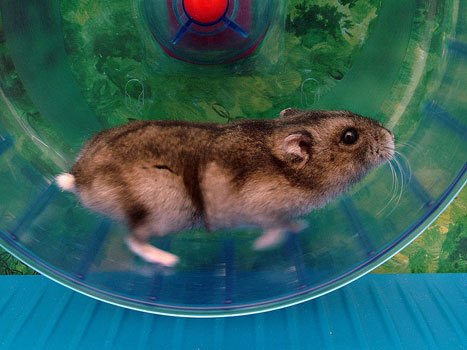
Source: Doenertier82 w/ Attribution-Share Alike 3.0 Unported license.
This parallels observations in humans:
In the postovulatory period, as estrogen declines, women tend to be less active, and postmenstrually, when estrogen is rising, activity increases[3]
And:
in a large study of elderly people, women with higher estrogen/androgen ratios reported more mental and physical energy than those with lower ratios[3]

Source: Peter van der Sluijs w/ Attribution-ShareAlike 1.0 Generic license.
You won't be as surprised to hear that treating rodents with testosterone increases their aggression, and castrating them reduces it.
What will be slightly less not-surprising is that more violent criminals have higher concentrations of testosterone than less violent criminals.[3] Note however that the cause-effect relation isn't clear-cut: it could be the increased aggression that causes more testosterone to be produced. However, men with extremely low testosterone (as in Klinefelter's syndrome) are more passive than men with average concentrations, and treating them with testosterone reverses both their physical and behavioral abnormalities.[3]

Source: Pxhere w/ CC0 Public Domain license.
Back to women. We are all aware of a thing called postpartum depression. It refers to feelings of depression many women feel after (post) "parting" with their child, meaning after they've given birth. The reason is that about a week after giving birth, estrogen and progesterone levels drop sharply. Though not all women experience actual postpartum depression, most women get the lite version:
it is not uncommon for women to experience emotional lability, crying, increased sensitivity, and even depression during the postpartum days[3]
Are the Onset of Periods a Reliable Measure of Socioeconomic Development?
Don't worry, I won't tell you boring things like when menarche starts in women and whatnot. That's partly because the average age of menarche in industrialized Europe has decreased by 2 to 3 months per decade over the past 150 years, and the same amount in the US over the past 100 years.[4] So by the time you read this, the information will be outdated anyway.
Interestingly, there's a reverse trend happening in certain countries in Europe, with girls being late to their first menstruation. Why?
This has been attributed to a resurgence of physical and psychological stress, as was seen in previous eras (e.g., World War II).[4]
What current situation could be causing as much stress as WWII? I don't know.

What's to blame that girls are not eager to become women?
Source: Shealah Craighead w/ Public Domain license & The World Affairs Council of Philadelphia w/ CC BY 2.0 license.
In general, better conditions = earlier menarche, and worse conditions = later menarche.
where the most rapid improvement is found, such as in Oaxaca, Greenland, or South Korea, the age of menarche decreases more rapidly. Where standards of living do not change, neither does the age of menarche. [...] Malnourished individuals have later age of menarche across the world.[4]
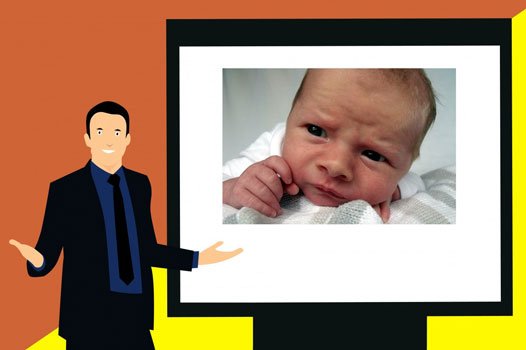
"Our company is doing fine, gentlemen, and my newborn daughter who's just had her first period is sufficient proof!"
Source: mohamed hassan & maxpixel w/ Public Domain license.
Once optimal conditions are met, periods cease to be influenced any further. But increased BMI (obesity) can keep lowering the age of menarche.
Having kept my promise of not mentioning boring facts like that, let's now proceed to a matter that is a constant boner of contention between ethnic groups.
Penis Size
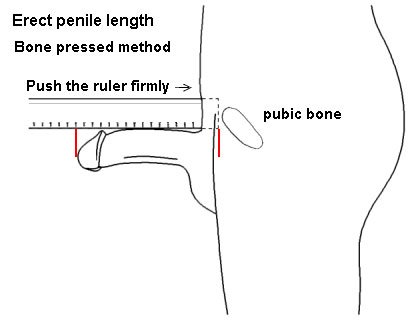-.jpg)
I knew this was a valid way to measure my penis length!
Source: Relaxseven w/ CC0 1.0 license.
Is it true that black people have the largest dongs, Asians the smallest, with whites falling somewhere in between? Yes, according to the Williams Textbook of Endocrinology:
Ethnic differences have been identified; the mean value in African-American men is 14.6 cm, and in Asians it is 10.6 cm. [...] 12.4 cm in the white adult[4]
Blood-Testes Barrier
That was a short section!
Now, I'm the intellectual type, more of a blood-brain barrier man than a blood-testes barrier person if you know what I mean (don't worry, I don't either), but I'll put in a word of warning here for the blood-testes barrier enthusiasts (perhaps for the likes of @trumpman to read, though I by no means mean to infringe on his brand):
DON'T GET KICKED IN THE BALLS!
Not that you'd do that willingly, but riding horses and certain college fraternity initiations can come pretty close.
You see, the immune system is not acquainted with the body's germ cells, that reside in the testes, even though both immune system and testes reside in the same house, and so if one night the doors that separate them get damaged because of some injury and the sperm goes exploring and the immune system catches a glimpse of the sperm moving in the shadows, it might mistake said sperm for a robber, and start shooting at it with antibodies, effectively launching a sperm autoimmune response, and this might lead to lower fertility.
Bottom line: Don't go mechanical bull-ridin' if you intend to be fertilizin'. (You're free to read that with a redneck accent.)
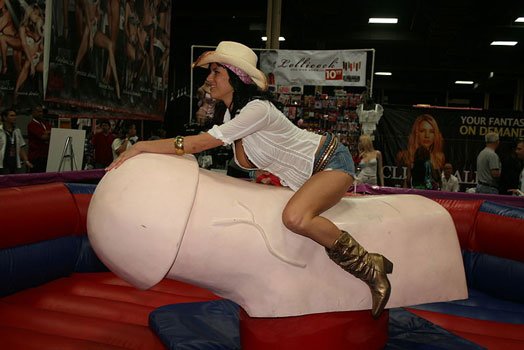
I got this when searching for 'mechanical bull riding'!
Source: Stinkie Pinkie w/ CC BY 2.0 license.
Of Breasts and Hormones

The hormones in your chicken breast might be making your breasts grow.
Source: Steve Johnson w/ CC BY 2.0 license.
When you read a title like "Epidemic of breast enlargement in an Italian school", your mind might go to breast implants. But what the title really means is gynecomastia in boys and thelarche in girls. The suspected culprit?
an uncontrolled supply of poultry and beef was suspected as being the cause of this outbreak[6]
And Italy is not alone. In Puerto Rico, they have the largest prevalence of gynecomastia and thelarche in the world, "about 10 to 15 times higher than that measured in a survey in Olmsted, Minnesota"[4]. And two thirds of those affected had ovarian cysts.[4] One of the suspected causes, estrogen used on animals to stimulate growth, was neither confirmed nor disconfirmed. But animal studies, as well as humans caught in industrial accidents, confirm the great impact exogenously administrated chemicals can have on an organism.[4] This just goes to show what hormones can do to you—and remember the main theme of this post: it's not just breasts.
The Hormone That Feminizes Bodies and Masculinizes Brains
Before coming (ahem) to the main attraction (which relates to how some other cultures masculinize their boys), let's consider, again, a hormone that actually does this. It pays to remember that "the basic sex of all mammals is female"[2], and it's the hormones that push ~50% of bodies (with their accompanying brains) toward a masculine direction. But sometimes the same hormone is used to do different things in men and women. How's that possible, if we're explaining the difference in the first place by appealing to hormones? Isn't that circular? Well let's check out an example.
Not one to use two things for disparate purposes when one thing will do, Nature uses the same hormone that feminizes female bodies, to masculinize male brains. The hormone is called estradiol, and female ovaries produce it. But estradiol in females doesn't get into their brains, because a protein called AFP glues itself to (has an affinity for) estradiol and has a chemical structure which prevents it from going through the blood-brain barrier. Testosterone however can go through the blood-brain barrier, and when it does it gets turned (aromatized) into estradiol, which proceeds to masculinize the male brain.[2]
Nature is often quite efficient!
The Village That Masculinizes Their Boys by Having Them Drink Semen

Source: pxhere w/ CC0 Public Domain license.
You can just type 'boys drinking sperm' into pornhub or some such, and I bet you'll find something along those lines. But if you want to find the real thing, you'll need to buy a ticket for Papua New Guinea, and go to the beautiful southern slopes of Mt. Sisa, where the climate is tropical and the air is appropriately humid and ritual pedophilic homosexual acts are practiced by the Etoro tribe between boys and men:
The Etoro believe that young boys must ingest the semen of their elders daily from the age of 7 until they turn 17 to achieve adult male status and to properly mature and grow strong.[7]
My suspicion is this was a tale made up by a clever boy-loving man of the ancient past, that kinda blew out of proportion. Perhaps the Etoro were very innocent (like the people in Ricky Gervais' movie The Invention of Lying), and he was the first person to take advantage of it. If we knew what he looked like, his picture might now be hanging on many a Catholic priest's wall of honor.
If you're interested in looking further into this cultural behavior, "ritual homosexuality" is a safe search term bet, but, as Herdt (who published "Ritualized Homosexuality in Melanesia" and kinda created this whole field) suggested, "boy insemination" might be more appropriate[8].
"Boy insemination" is not a forced insemination, mind you:
I found little concern or anxiety among initiands to receive sufficient semen through oral insemination to grow into full men[8]
These stories have led many in the literature, as well as the public, to view these practices with a negative eye. In the following few paragraphs, I would like to turn this critical eye toward our own selves and suppositions.
You might think that the youngness of the Etoro children and their ignorance of biological information makes them incapable of freely choosing their sexual practices, and therefore they are being raped despite their obvious consent. But then you'd have to grant that most sex is in fact rape, since it's based mostly on ignorance of quite a lot of relevant information, including the partner's inner thoughts (who is ever really truly entirely brutally honest with their partner? eh?) To have real consent, you need absolute honesty from everyone and a great deal of information about all subjects under the sky, both ancient and current: I mean, how do you know you wouldn't prefer to have closer bonds to your fellow males by having sex with them from age -teen, as the Spartans did? Barring that amount of information and knowledge, you don't really have consent, just people who follow random cultural mores. Or at least that's what I'm putting forward to you!
The sheer differences in the practices of the Melanesian groups (the Etoro is just one of these groups) — like whether they exclude women or not, whether "boy insemination" happens mostly orally or is preceded by anal sex, etc. — would, one would think, convince us, and them, that "brainwashing" is an apter term than "consent". And yet, not only do they consent, they also ridicule those who don't follow their own practices:
each of these groups considered their own male-male sexual practices to be proper and those of their neighbors to be repulsive and inimical to manhood. Apparently in New Guinea, as well as elsewhere, different strokes for different folks.[8]
Let me put it more crassly, hoping it'll stick: 100 years ago in mainstream America (when racism was rampant) the average white woman wouldn't be caught dead having sex with a black man, whereas now (when rap culture is rampant) they line up outside 50 Cent concerts hoping they will. I put it to you that most cases of consent are not that different from that of a woman wearing a burka "of her own free will".
For a more nuanced and sympathetic and, frankly, accurate account of a group that is not the Etoro but is very much like it, see here.
Curtain Close
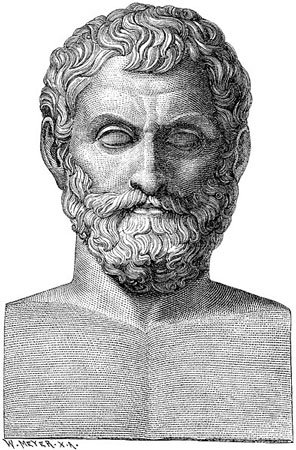
Thales of Miletus. The first philosopher. Also, the first scientist. Just call him God and get it over with! The first two letters are already in place anyway.
Source: Ernst Wallis et al w/ Public Domain license.
I began this post thinking I'd be talking about pubertal hormones, but I think it ended up being more of a reflection on freedom and choice. At the bottom you have your biology ramming DNA up your phenotype, and at the top you have your society shoving culture down your throat (quite literally in certain societies), and there you are in the middle, squashed and trying to squirm yourself toward freedom.
So what can you do about it?
When, as the story goes, the Seven Sages of Ancient Greece got together and compiled their adages, "Know thyself" was a recurring counsel. It was so popular that out of the Seven Sages, the saying was attributed to eleven of them (link). Today it's still the best prescription, equally useful whether you use it to decide if you want to drink human groin seed, or if you want to attend a college party and down barrels of fermented grain seed instead.
But what's the best way to know yourself and be "free"? Books, of course. Knowledge locates you outside your arbitrary spatial and temporal environs, and puts you in contact with the greatest minds that ever lived, and with the most diverse thoughts and cultures. You'd be equally determined, strictly speaking. But at least it'll be from no one source, but rather from all of them, to the chagrin of those who want to monopolize your attention. You'll be as close to being a self-determining Theos as humanly possible!
REFERENCES
Mealey, L. (2000). Sex Differences: Developmental and Evolutionary Strategies. 1st ed. Academic Press. Available online at: https://doi.org/10.1016/B978-0-12-487460-2.X5000-4
Ellis, L. (1986). Evidence of neuroandrogenic etiology of sex roles from a combined analysis of human, nonhuman primate and nonprimate mammalian studies. Personality and Individual Differences, [online] 7(4), pp.519-552. Available at: http://psycnet.apa.org/doi/10.1016/0191-8869(86)90131-5.
Buchanan, C., Eccles, J. and Becker, J. (1992). Are adolescents the victims of raging hormones? Evidence for activational effects of hormones on moods and behavior at adolescence. Psychological Bulletin, [online] 111(1), pp.62-107. Available at: http://dx.doi.org/10.1037/0033-2909.111.1.62.
Melmed, S., Polonsky, K., Larsen, P. and Kronenberg, H. (2016). Williams textbook of endocrinology. 13th ed. Philadelphia: Elsevier, Inc., pp.1089-1218. Available at: https://www.elsevier.com/books/williams-textbook-of-endocrinology/9780323297387.
Wikipedia contributors. (2018, December 11). Blood–testis barrier. In Wikipedia, The Free Encyclopedia. Retrieved 18:50, January 31, 2019, from https://en.wikipedia.org/w/index.php?title=Blood%E2%80%93testis_barrier&oldid=873148195
Fara, G., Corvo, G., Bernuzzi, S., Bigatello, A., Pietro, C., Scaglioni, S. and Chiumello, G. (1979). EPIDEMIC OF BREAST ENLARGEMENT IN AN ITALIAN SCHOOL. The Lancet, [online] 314(8137), pp.295-297. Available at: https://doi.org/10.1016/S0140-6736(79)90304-0.
Wikipedia contributors. (2018, May 28). Etoro people. In Wikipedia, The Free Encyclopedia. Retrieved 20:53, February 2, 2019, from https://en.wikipedia.org/w/index.php?title=Etoro_people&oldid=843271876
Knauft, B. (2003). What Ever Happened to Ritualized Homosexuality? Modern Sexual Subjects in Melanesia and Elsewhere. Annual Review of Sex Research, [online] 14(1), pp.137-159. Available at: https://www.tandfonline.com/doi/pdf/10.1080/10532528.2003.10559814.
Sanders, B. and Soares, M. (1986). Sexual maturation and spatial ability in college students. Developmental Psychology, [online] 22(2), pp.199-203. Available at: http://dx.doi.org/10.1037/0012-1649.22.2.199.
Voyer, D., Voyer, S. and Bryden, M. (1995). Magnitude of Sex Differences in Spatial Abilities: A Meta-Analysis and Consideration of Critical Variables. Psychological Bulletin, [online] 117(2), pp.250-270. Available at: http://dx.doi.org/10.1037/0033-2909.117.2.250.
Mackey, W. and Johnson, J. (1994). Gender Dimorphism of a Visual Anomaly: A Deductive Prediction Based on an Ethological Model. The Journal of Genetic Psychology, [online] 155(2), pp.219-231. Available at: https://doi.org/10.1080/00221325.1994.9914773.
Velle, W. (1987). Sex Differences in Sensory Functions. Perspectives in Biology and Medicine, [online] 30(4), pp.490-522. Available at: http://dx.doi.org/10.1353/pbm.1987.0015.
Fillingim, R. and Maixner, W. (1995). Gender differences in the responses to noxious stimuli. Pain Forum, [online] 4(4), pp.209-221. Available at: http://dx.doi.org/10.1016/s1082-3174(11)80022-x.
Wilson, M. and Daly, M. (1985). Competitiveness, risk taking, and violence: the young male syndrome. Ethology and Sociobiology, [online] 6(1), pp.59-73. Available at: https://doi.org/10.1016/0162-3095(85)90041-X.
Eagly, A. and Steffen, V. (1986). Gender and aggressive behavior: A meta-analytic review of the social psychological literature. Psychological Bulletin, [online] 100(3), pp.309-330. Available at: http://dx.doi.org/10.1037/0033-2909.100.3.309.
Feingold, A. (1994). Gender differences in personality: A meta-analysis. Psychological Bulletin, [online] 116(3), pp.429-456. Available at: http://dx.doi.org/10.1037/0033-2909.116.3.429.
Harris, J., Rushton, J., Hampson, E. and Jackson, D. (1996). Salivary testosterone and self-report aggressive and pro-social personality characteristics in men and women. Aggressive Behavior, [online] 22(5), pp.321-331. Available at: http://dx.doi.org/10.1002/(SICI)1098-2337(1996)22:5<321::AID-AB1>3.0.CO;2-M.
Zuckerman, M. (1984). Sensation seeking: A comparative approach to a human trait. Behavioral and Brain Sciences, [online] 7(03), pp.413-434. Available at: https://doi.org/10.1017/S0140525X00018938.
Zuckerman, M. (1990). The Psychophysiology of Sensation Seeking. Journal of Personality, [online] 58(1), pp.313-345. Available at: https://doi.org/10.1111/j.1467-6494.1990.tb00918.x.
Zuckerman, M., Buchsbaum, M. and Murphy, D. (1980). Sensation seeking and its biological correlates. Psychological Bulletin, [online] 88(1), pp.187-214. Available at: http://dx.doi.org/10.1037/0033-2909.88.1.187.
Baucom, D., Besch, P. and Callahan, S. (1985). Relation between testosterone concentration, sex role identity, and personality among females. Journal of Personality and Social Psychology, [online] 48(5), pp.1218-1226. Available at: http://dx.doi.org/10.1037//0022-3514.48.5.1218.
Gouchie, C. and Kimura, D. (1991). The relationship between testosterone levels and cognitive ability patterns. Psychoneuroendocrinology, [online] 16(4), pp.323-334. Available at: https://doi.org/10.1016/0306-4530(91)90018-O.
ANON (1970). Effects of Sexual Activity on Beard Growth in Man. Nature, [online] 226(5248), pp.869-870. Available at: http://dx.doi.org/10.1038/226869a0.
Hedricks, C. (1994). Female Sexual Activity across the Human Menstrual Cycle. Annual Review of Sex Research, [online] 5(1), pp.122-172. Available at: http://dx.doi.org/10.1080/10532528.1994.10559895.
Zillmann, D., Schweitzer, K. and Mundorf, N. (1994). Menstrual cycle variation of women's interest in erotica. Archives of Sexual Behavior, [online] 23(5), pp.579-597. Available at: http://dx.doi.org/10.1007/BF01541499.
Kimura, D. and Hampson, E. (1994). Cognitive Pattern in Men and Women Is Influenced by Fluctuations in Sex Hormones. Current Directions in Psychological Science, [online] 3(2), pp.57-61. Available at: http://dx.doi.org/10.1111/1467-8721.ep10769964.
Parlee, M. (1983). Menstrual rhythm in sensory processes: A review of fluctuations in vision, olfaction, audition, taste, and touch. Psychological Bulletin, [online] 93(3), pp.539-548. Available at: http://dx.doi.org/10.1037/0033-2909.93.3.539.
Shute, V., Pellegrino, J., Hubert, L. and Reynolds, R. (1983). The relationship between androgen levels and human spatial abilities. Bulletin of the Psychonomic Society, [online] 21(6), pp.465-468. Available at: http://dx.doi.org/10.3758/BF03330010.
Silverman, I. and Phillips, K. (1993). Effects of estrogen changes during the menstrual cycle on spatial performance. Ethology and Sociobiology, [online] 14(4), pp.257-269. Available at: https://doi.org/10.1016/0162-3095(93)90021-9.
Earlier Sex Differences episodes:
14: Sex Drive: Toward the Old World
13: Sex and the Sexes: Talking Past Each Other
11: Sex Drive: Fantasy Sex Is Where To Find Id
10: Sex Drive: Do Women Have More of Id?
9: The 70-year Cognitive Puzzle That Still Divides The Sexes
8: Do Transsexual Persons Have An Opposite-Sex Brain?
7: Do Parents Stereotype Their Children's Gender?
6: Sex Differences: Do females and males have different brains? Addendum
5: Sex Differences: Do females and males have different brains? Pt 3
4: Sex Differences: Do females and males have different brains? Pt 2
3: Sex Differences: Do females and males have different brains?
2: Sex Differences: Check out the gonads on that one!
1: Sex Differences: Does the Chromosome Maketh the Man?
steemSTEM is the go-to place for science on Steemit. Check it out at @steemstem or browse the #steemSTEM tag or chat live on discord and definitely visit www.steemstem.io
Have you voted for steemSTEM Witness?

OMG, how do you find these pictures?!?!? :D
I will come back later ;)
Edited:
Well, sadly enough, it is not only the meat but the plastic we wrap our food in. So being a vegetarian won't help as long as you drink water from a plastic bottle.
Yep, this is it. The dramatic human existence, torn between biology, culture, closest environment, and external events... A mess of thoughts, memories, emotions, interpretations, dreams ... self.
So, I see you brought up the question of freedom. I thought that s determinist like you doesn't believe that free will exist? :P
I know you're just messing with me, because you've surely noticed that I use freedom kinda metaphorically, to indicate 'being influenced by everything' as opposed to 'being influenced by just a few things'!
Determinist power ✊
:P
:D Of course, I am messing with you! I just couldn't miss the opportunity :D
I am a semi-determinist, though. I know, that you are going to say that there is no such thing ... BUT! Semi-determinists rock! ;)
No such thi ... waaait a minute! Was I determined to say that?!
Hahaha :D I don't know. I suppose you had a CHOICE :D
You should win award for choice in title picture. Its innocent as a context free pic, but will now haunt my dreams because of the subject matter :P
I'm not too surprised that a few cultures throughout the world have ritualistic pedophilia. There are even examples of canabilism in isolated tribes (one famous example is in New Guinea where Kuru was first discovered).
Coupling your comment to mobbs', there's something strange going on with New Guinea!
I would have known this was an alexander post by the title alone... eesh!
Also, isn't it papua new guinea that also have sex with... donkeys? as a rite of passage into manhood, to 'prepare' for women. It's some whacky place anyway. Maybe somewhere in Columbia actually...
My, oh my! I haven't read this. Just glanced at the pictures. This ought to be memorable. I can tell you are pushing the edges of comfort (for some people) with this one. Will read with care when all the demands of the day are behind me. I think I'm looking forward to it :))
Edit: I'm back!
You sure know how to put a blog together. While the subject may make some people uncomfortable, you have a light touch--I think the pictures are more startling than the text. Now, about the text:
I was a history teacher (actually social studies) and a student of comparative literature, so I take a broad view of culture. As I read your blog I thought of the Fore, who ritualistically consumed each others brains. And I thought of the Incas, and their custom of allowing the dead to hold property and wield power over the living. So no custom is so bizarre that it astonishes me, although I am often amazed that customs arise that work against the success of a people. This seems to go against the biological imperative of survival of the species.
As for looking at mammal studies to enlighten us about people--I don't really buy it. I know that when it comes to drug trials these studies don't hold up. Different mammalian species may have a lot of characteristics in common, but these species are not identical.
Good luck with this blog. You 'boldly go' where few men (and women) dare to tread. Kudos for your entertaining writing, excellent research and inimitable @alexander.alexis delivery. How will you top this one?
Hi @alexander.alexis!
Your post was upvoted by Utopian.io in cooperation with @steemstem - supporting knowledge, innovation and technological advancement on the Steem Blockchain.
Contribute to Open Source with utopian.io
Learn how to contribute on our website and join the new open source economy.
Want to chat? Join the Utopian Community on Discord https://discord.gg/h52nFrV
drinking semen? that is so disgusting.
Don't knock it until you try it
But you have to knock one out before you can try it. #paradox
Alright clever, clever
Congratulations @alexander.alexis! You have completed the following achievement on the Steem blockchain and have been rewarded with new badge(s) :
Click here to view your Board
If you no longer want to receive notifications, reply to this comment with the word
STOPDo not miss the last post from @steemitboard:
Hello @alexander.alexis! This is a friendly reminder that you have 3000 Partiko Points unclaimed in your Partiko account!
Partiko is a fast and beautiful mobile app for Steem, and it’s the most popular Steem mobile app out there! Download Partiko using the link below and login using SteemConnect to claim your 3000 Partiko points! You can easily convert them into Steem token!
https://partiko.app/referral/partiko